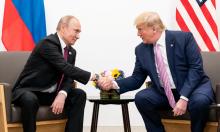David R. Hoffman: "Lies, Damned Lies and Statistics"
Former British Prime Minister Benjamin Disraeli once said, "There are three types of lies: lies, damned lies and statistics"
Adolph Hitler opined in his book Mein Kampf that when leaders lie, they should tell "great" lies, because while people tend to recognize "little" lies, they have a proclivity to believe that political leaders would not be untruthful about issues or events of great magnitude or severity.
Lying as a political strategy, of course, is not confined to the American political arena. But it has surreptitiously become such an integral part of this arena that the "art of lying" is now widely accepted in other venues as well. In fact, despite the idealistic adages that "honesty is the best policy," or "cheaters never prosper," the tragic reality is that far too frequently the dishonest are the ones who do prosper. In fact, I can honestly (a word perhaps out of place in an article about lying) say that I have rarely in my adult life been in an employment situation where people
did not lie.
I recall during my first "real" job how a new manager openly announced that he "would fire his own mother if it helped him get ahead." This was not hyperbole. In an effort to impress his superiors, he called in an investigator to question employees about money that had allegedly been "stolen." This ruse might have been successful had he been a little more informed about company procedure. Unfortunately for him, and fortunately for everyone else, the "stolen" money disappeared on a day when the work records from the previous week were compared to the current week's records. These records were always kept in the manager's top desk drawer, and when employees retrieved them to make the weekly comparison, they subsequently discovered that all the "stolen" money had been concealed underneath. Yet what was this manager's punishment for fabricating a crime and attempting to falsely implicate others?--a long, successful career complete with a hefty retirement package and stock options.
My first move from part-time to full-time employment eventually exposed me to another lie. Advancements in computer technology had reduced workforces across the nation, and my company was not exempt. Rumors of job loss, buttressed by reports in financial magazines of how my employer's stocks would soar once proposed job cuts were implemented, made workers, including myself, apprehensive, inquisitive, and uncertain about the future. In response to these concerns, the district manager convened a meeting where we were informed that, "No positions will be eliminated. The new technology will simply open up new jobs that you will be required to perform." Two weeks later this same manager smirked as he handed us our final severance checks, exclaiming, "I suppose you saw this coming."
After these experiences, I began to wonder whether there was any institution where "honesty was the best policy." I thought I found the answer in America's legal system. After all, I reasoned, is not this system premised upon the truth, are there not penalties for lying, and doesn't the awesome power this system holds over life, liberty and property attract individuals dedicated toward doing "the right thing?"
Three years of law school and a jolt of reality later, I realized how wrong I had been. One of my first recollections of the "process" was sitting three feet away from a prosecutor who was angrily berating a defense lawyer for "daring" to expose that a police officer's perjured testimony had resulted in a wrongful conviction. I watched the guilty receive light sentences for admitting their guilt, while the innocent were kept imprisoned for refusing to confess to "crimes" they did not commit, because such refusals were anathema to the system's arrogant facade of "infallibility." Eventually I came to realize that some of America's greatest criminals wore suits, ties and black robes, and occupied prosecutors' offices, courtrooms, and governors' mansions throughout the nation, reaching even into the White House. And these individuals, through the use of "immunity" doctrines, political machinations, cover-ups and other tactics, will never have to "look over their shoulders" for fear of capture.
So finally I stumbled onto the world of higher education. Surely as a professor within cloistered halls and "ivory towers," I would discover an abundance of honesty. After all, colleges and universities normally have stringent codes of student conduct, strict rules against "cheating," and professors are expected to inject concepts of ethics and integrity into classroom lectures.
But I soon discovered that the university where I was employed felt no obligation to adhere to any ethical code of conduct itself. This discovery came after I was told by the head of a hiring committee that I had, after years of part-time teaching, finally been awarded a full-time position. My euphoria lasted approximately a month, when I was not only advised that I would not be receiving this position, but I was also informed that the head of the hiring committee had denied even offering it to me.
In response, I offered to take a polygraph (lie detector) test on the condition that the head of the hiring committee take one as well. I knew she would refuse (she did), and I believed her refusal would serve a twofold purpose: first, it would demonstrate that I was telling the truth; second, it would give the administration the impetus to practice the ethics and integrity it demanded in students and faculty.
Needless to say, the lies won out once again, and while this committee member advanced to a more lucrative position at another university, I was unceremoniously removed from my part-time teaching duties.
Some may ask, "What is the relevance behind personal stories about lying?" One need only look at modern-day America to find the answer. Lying is such an intrinsic tactic of the Bush regime that the provisions and protections of the United States Constitution, particularly the Bill of Rights, are rapidly becoming lies.
The Bush coup in the year 2000 exposed for the first time in many years what some already knew--that the nation is controlled by a corrupt oligarchy, and that this oligarchy will place its "figurehead" into power by any means necessary. Furthermore this oligarchy reviles Constitutional constraints on executive power, and loathes the Bill of Rights for protecting individuals from governmental abuses and the tyranny of the majority.
But while this coup put individuals into place that were willing to dismantle the Constitution and Bill of Rights, such a task was difficult to accomplish in times of relative calm. During such periods, Americans are historically more wary about intrusions upon their rights. The terrorist attacks of September 11, 2001, however, ultimately permitted this dismantlement to proceed. While reports continue to cite the "intelligence failures" that led to these attacks, there is little doubt that they fit conveniently into the Bush administration's agenda. Suddenly, every war, every unconstitutional law, every diminishment of freedom, could be "justified" as essential to the "war on terror." The majority of Americans could be convinced, without credible evidence, of Iraqi links to terrorism or "weapons of mass destruction" (WMDS). Simply put, those in power could lie without compunction, as long as they continued to generate a climate of fear, which made many people reluctant to question the veracity of what they were being told.
Perhaps even more tragically, those who dare to question, as evidenced by the despotic views of Defense Secretary Donald Rumsfeld, risk being labeled "unpatriotic." The irony of this should not be lost. Those who choose to exercise their most basic rights as Americans are now unpatriotic for doing so. This version of "patriotism" is far removed from those who founded this nation, who questioned and ultimately rebelled against tyranny. Apparently now a patriot is supposed to be an obsequious drone mindlessly regurgitating the "official" version of events, or a profiteer who promotes war through talk shows, songs, books and magazines for exorbitant salaries or fees, all from the "dangerous" confines of plush offices and studios.
The problem with lies is that they eventually lead to more lies. This is evidenced by the bevy of Bush apologists, who first promoted the Iraqi war because of alleged WMDs, and who now, since no weapons have yet been found, endeavor to justify the war on human rights grounds. But this raises the question: Are the only people in the world deserving of human rights those fortunate enough to live in countries with large oil reserves and the prospect of lucrative "rebuilding" contracts that can be awarded to political cronies? Nobel laureate Aung San Suu Kyi's party still thirsts for democracy in Burma (Myanmar); countries in Africa still bleed from civil wars, many caused by the remnants of "cold war" politics; and in Cambodia many members of the Khmer Rouge, a group that may have (in proportion to Cambodia's population) committed the worst genocide in world history, live relatively opulent lives.
This manipulation of fear to erode fundamental rights and freedoms is, unfortunately, not new to America. During World War One, the "Alien, Espionage and Sedition" acts were used to suppress dissent and destroy burgeoning political movements. During World War Two, the United States Supreme Court permitted Americans of Japanese descent to be forced into
"internment camps." The Smith Act of the 1940s, upheld by the Supreme Court in DENNIS V. UNITED STATES, helped to launch the "red scare," which gave rise to McCarthyism in the 1950s.
Today the DENNIS case is perhaps better known for the dissenting opinion of Justice Hugo Black: "Public opinion being what it now is, few will protest the conviction of these petitioners. There is hope, however, that in calmer times, when present pressures, passions and fears subside, this or some later Court will restore the First Amendment liberties to the high preferred place where they belong in a free society."
Justice Black's observation that America will enter "calmer times" appears to be an inherent fear of the Bush administration. So there is now a concerted effort by Attorney General John Ashcroft, some members of the United States Supreme Court, and Bush himself to ensure that the liberties taken after September 11th will never be restored.
One tacit move towards this goal occurred when the Supreme Court recently upheld the concept of "random drug testing" in public schools, where students, based on absolutely no suspicion whatsoever, are forced to submit to invasive and degrading procedures under the auspices of "fighting drug abuse." A clever strategy, for how can one argue with such a noble purpose?
The answer is simply by recognizing that the stated purpose is a facade. The real motivation behind random drug testing is to indoctrinate children with the idea that a ubiquitous "big brother" controls even their most intimate bodily functions. Through this indoctrination, when these children become adults, they will be more receptive to further intrusions upon their rights and privacy, as "big brother" monitors what they watch, write or read, invades their homes without warrants or suspicions, and locks away their loved ones without any semblance of legal due process. In short, to create in America the very system of regimentation, spying and control the Bush administration claimed to abhor in Iraq.
Recently a "joke" circulated that is a fitting conclusion to this article. The word "joke" is in quotes, because one day these words may be more prophetic than amusing:
"Attorney General John Ashcroft was speaking at an elementary school about rights and freedoms in America. 'Any questions,' he asked. A little boy raised his hand. 'My name is Billy, and I have two questions. First, why are you using the Patriot Act to limit American's civil liberties? Second, why haven't any weapons of mass destruction been found in Iraq?' Just then the bell rang, and Ashcroft stated, 'We'll resume after recess.' Recess ended and Ashcroft again asked, 'Are there any questions? A little girl raised her hand. 'My name is Julie, and I have four questions. First, why are you using the Patriot Act to limit American's civil liberties? Second, why haven't any weapons of mass destruction been found in Iraq? Third, why did the recess bell ring ten minutes early? Fourth, where's Billy?'"
Subscribe to Pravda.Ru Telegram channel, Facebook, RSS!




